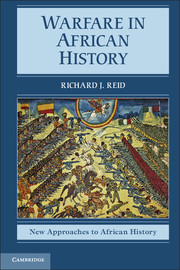Book contents
- Frontmatter
- Contents
- Maps
- Preface
- Acknowledgements
- List of maps
- Chapter 1 The Contours of Violence
- Chapter 2 Arms in Africa’s Antiquity
- Chapter 3 The Military Foundations of State and Society, to circa 1600
- Chapter 4 Destruction and Construction, circa 1600 to circa 1800
- Chapter 5 Transformations in Violence
- Chapter 6 Revolutions Incomplete
- Index
- References
Chapter 5 - Transformations in Violence
Military Revolution and the ‘Long’ Nineteenth Century
Published online by Cambridge University Press: 05 June 2012
- Frontmatter
- Contents
- Maps
- Preface
- Acknowledgements
- List of maps
- Chapter 1 The Contours of Violence
- Chapter 2 Arms in Africa’s Antiquity
- Chapter 3 The Military Foundations of State and Society, to circa 1600
- Chapter 4 Destruction and Construction, circa 1600 to circa 1800
- Chapter 5 Transformations in Violence
- Chapter 6 Revolutions Incomplete
- Index
- References
Summary
In the early nineteenth century, a series of intertwined processes, combined with a concatenation of unrelated events, instigated a long-term revolution in military and political affairs. In part, this was the outcome of the new era of economic relations with the West, across Atlantic Africa; at the same time, the so-called illegal slave trade perpetuated and intensified earlier patterns of organised violence, while the slave trade escalated on the eastern side of the continent, leading to new military and political forms. Elsewhere, heightening internal competitions for resources and religious fervency combined to produce novel military processes, or more effective variations of old ones. By mid-century, a range of new states and societies, as well as evolving versions of existing ones, was emerging through violence; violence itself had become one of the key expressions of political and cultural creativity, and war became ever more important as an extension of economic policy. The equipment at Africans’ disposal became more sophisticated and more effectively deployed; the organisation and structure of African forces became ever more efficient and more professionalised. The transformation in military affairs was still evolving in the late nineteenth century with the onset of the European partition, the latter driven in no small part by a wilful or unconscious misreading of events in Africa. Yet the ‘scramble for Africa’ itself – in fact a multitude of invasions and prolonged armed incursions – was made possible by Africa’s own military innovations, not least in terms of the manpower available to a small number of European officers and Africans’ tactical skill and knowledge of both enemies and terrain. Europe was also able to take advantage of the intense intercommunity and interstate conflict across the continent which was itself one of the clearest manifestations of the military revolution; comparatively small European forces, with frequently superior weaponry and better organisation and drill, were able to insert themselves between states and societies and exercise considerable leverage over them. In a sense, therefore, the era of the partition may be considered an extension of a nineteenth-century African military revolution which has not yet run its course.
- Type
- Chapter
- Information
- Warfare in African History , pp. 107 - 146Publisher: Cambridge University PressPrint publication year: 2012

